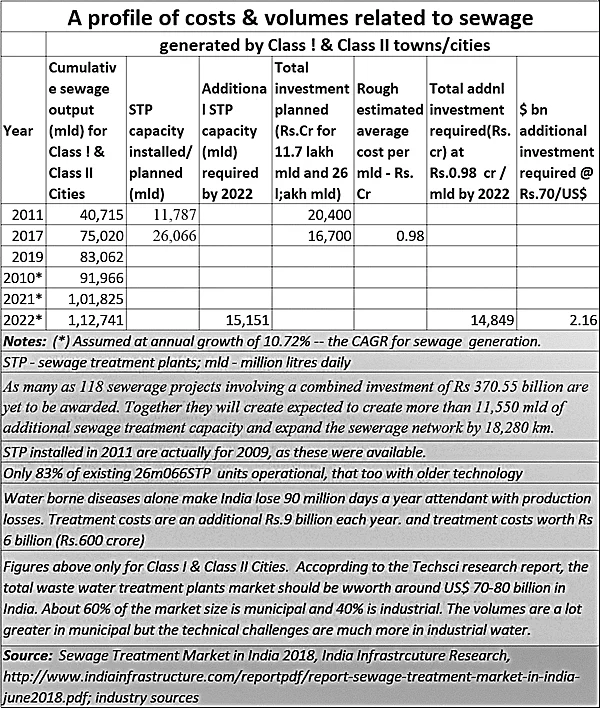The last few months, politicians of all colours have begun making all kind of pronouncements about waste management. It is therefore time that someone pointed out that not all the views aired in public are right. In fact, some of them may not even be desirable in the larger context of things.
So, here is a sampling.
- Waste must be segregated before it can be picked up by municipal or designated authorities. That is not really required. In fact, go and check with Israel’s technicians and they will tell you that human segregation of waste is quite inefficient.
It must be segregated once again at the plant level. Instead, they prefer people to send in unsegregated waste which is dumped into one of their large treatment pits. Water is added and then spun around using a centrifuge.
All waste automatically gets separated in layers, and separation of each type of layer is then quite easy and efficient. Water is later sucked out, and treated. It is strange that India continues to use the European model, when a more efficient method from Israel is available.
- Plastic must be banned. Politicians have been misled by sly bureaucrats that this is the only solution. And they have not bothered to suggest what must be used instead of plastic. Cloth is too expensive. And it does not allow storage of anything that is liquid, or melts.
Paper causes the destruction of trees and bamboos, and also adds to water pollution, unless controlled stringently. Glass is heavy and fragile. Instead India should be doing what Singapore (https://www.youtube.com/watch?v=Dei_duocsu4&feature=youtu.be) and Sweden (http://www.asiaconverge.com/2019/08/bmc-must-learn-waste-management-from-ntpc/) do–just incinerate plastic and use the heat to warm up whatever needs to be heated. In India the state owned NTPC is doing precisely that–it is collecting dry waste in Varanasi and is incinerating it. The heat is captured for generating electricity which is then sold back to the state grid at pre-negotiated prices (http://www.asiaconverge.com/2019/08/bmc-must-learn-waste-management-from-ntpc/). NTPC now plans doing this for the East Delhi Municipal Corporation (EMDC) and for Surat Municipality as well.

The pollution control authorities under the aegis of Central Pollution Control Board (https://cpcb.nic.in/cpcb-portals/) do a commendable job. Haha! Just visit the CPCB website. The first page itself has no information, except weblinks. Nor is there any information on revenue collection and expenditure in respect of industrial effluent or medical waste (Medical waste https://cpcb.nic.in/bio-medical-waste-rules/); no data on how many firms have been prosecuted for which type of infringement; just nothing on notices served and resultant compliance or penalties imposed. Without such information, it is difficult to even know if the agency is functional. Counterparts of the CPCB in other states are known to be quite quick to collect money, but quite poor on deliverables and data.
- More garbage collection trucks are needed. That too is strange. Look at the kinds of vehicles Adar Poonawala of the Serum Institute uses (http://www.asiaconverge.com/2018/07/adar-poonawala-rides-higher/). Poonawala collects garbage in areas close to Pune and hands it back to the municipal authorities for treatment. Locals will tell you that he does a better job than municipal corporations, and at lower costs. He uses small vehicles that scurry around into every small street and scoop up the garbage and periodically empty this into a large vehicle parked nearby. No big vehicles lumbering around. No excuses for not touching some streets because they are too narrow.
- More spaces for landfills are required. An absurd request. Sweden banned all landfills in 2004. As a result, its people came up with solutions that deal with managing every kind of waste and even making money out of waste. So good are they at this work, that they’ve even begun importing agro and forest waste from nearby Norway and the UK. More waste means more money for them. Time to do what Sweden does.
The fact is that neither the policymaker nor CPCB has done any homework. The former has allowed bureaucrats to mislead him. The latter has become collusive and capricious.
Yet, the work to be done is huge (see table) and time is running short. That why this author has insisted on third party inspections–probably by globally reputed agencies like SGS (https://www.sgs.com).
There is an urgent need to professionalise waste management–even by auctioning off garbage collection and waste management with 30-year concessions–with clearly defined deliverables and with third party inspections. It is time to stop advocating the banning of plastics and instead focus on treatment of waste.
Is it possible to talk about Swachh Bharat in terms of better waste management? Or will Swachh Bharat end up with knee-jerk responses, and with no clear-cut strategy?
RN Bhaskar is consulting editor with FPJ.










